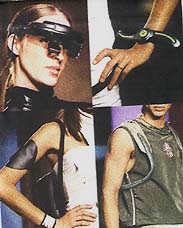Overview - Undisciplined Cultures
Literature and Technology after Postmodernism
English 350 - Fall 2001
Jay Clayton, Vanderbilt University

This course explores a convergence that is taking place amongscience, technology,popular culture, and the humanities. At the beginning of the twenty-first century, digital technology has fostered an "undisciplining" of culture. Today, literary works crisscross boundaries, moving freely between "low" and "high" culture, blurring genres, and engaging in disciplinary bricolage. The result is an emerging literary culture that is not easily described by the discourse of postmodernism.
Not since the early decades of the nineteenth century has there been such synergy between technological and literary creativity, not only in digital media but also in older print forms, not only in hypermedia on the web but also in the established film and music industries. Novels, hypertexts, films, performance pieces, online art, role playing games, and sound art find a common ground with science and engineering in their recognition of the centrality of code to contemporary forms of knowledge.
Literary culture, broadly conceived, has a crucial place in this new information order, as it never did in the older industrial world. As experts in the analysis of information, as people long used to thinking through textual puzzles, deciphering complex verbal messages, responding to semiotic cues of all kinds, people with literary habits of mind have a unique opportunity to transform the emerging information economy.
This semester, we will begin with several representative theories of postmodernism, then move to experimental works that challenge the limits of disciplinary thinking. Each text we read or view concerns the place of either digital or biomedical technology in culture. Students will watch a movie or multimedia piece every other week, while reading novels and stories by Andrea Barrett, Philip Kerr, Roger McDonald, Richard Powers, Mary Shelley, Neal Stephenson, and Jeanette Winterson; a play by Tom Stoppard; hypertexts by Mary-Kim Arnold and Matthew Derby, Ed Falco, and Shelley Jackson; excerpts from scientific texts by Charles Darwin, Richard Dawkins, Claude Shannon, and Alan Turing; and critical writings by Espen J. Aarseth, Jean Baudrilliard, Jay Bolter and Richard Grusin, Albert Borgmann, N. Katherine Hayles, Donna Haraway, Fredric Jameson, Janet Murray, and the instructor.
Students will create a hypertext or multimedia piece as part of their class presentation and will complete a research paper for their final project. In some cases, students may substitute a substantial scholarly digital project for the final research paper.